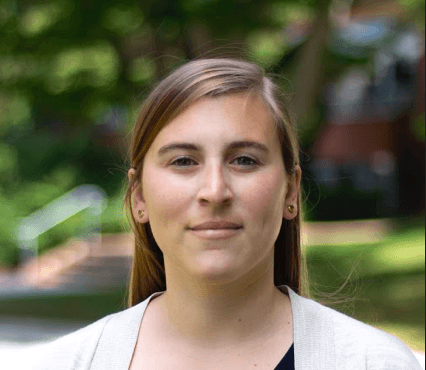A new forensic professor, Chelsea Farrell, looks forward to her first semester teaching at the university. Photo by Grace DeSanti.
Chelsea Farrell, the University of Rhode Island’s newest criminal justice professor, is excited to get to know her students and URI as a whole.
The New Jersey-native found herself in Kingston after getting a bachelor’s degree in psychology from Westminster College in Salt Lake City, Utah, and a master’s degree and Ph.D. in criminology and criminal justice from Northeastern University in Boston.
In between undergrad and graduate school, Farrell worked as a mental health worker for a year, helping adolescent offenders at a private facility with counseling, rather than sending them to prisons or juvenile detention centers.
“While I worked there, I became really aware of what was going on with systemic impacts,” said Farrell. “[The counselors] had a one on one impact on them, but it felt like the problems that most of these youth had seemed bigger.”
This inspired her to go into researching criminology, specifically how race and gender affect victimology and arrests. She thinks this area of study is important for understanding how to make the criminal justice system better.
“Gender shapes our behavior and the way people view us along with race,” Farrell explained. “I think it matters because if we try to make our criminal justice system better, but we don’t understand how it operates for different groups of people then any efforts we make for fixing it are only going to help for some people.”
Barbara Costello, the interim Criminology and Criminal Justice (CCJ) department head, also believes that Farrell’s research is an important social issue.
“Her research is very interesting, it’s on a topic that’s really important and really timely right now,” said Costello. “It’s important both in terms of its social importance and in terms of its scholarly contribution.”
Despite the importance of her research, Farrell was worried that if she didn’t start teaching then she wouldn’t be able to reach more than just a few people.
“Teaching became a means of getting that information to people whose minds are young and willing to hear about those types of important concepts, and teach people about things that the news and most families don’t talk about: underlying systemic structural issues that affect crime and mental illness,” said Farrell.
Knowing that her work wouldn’t reach more than a few people if she just stuck with doing research, Farrell began teaching at Northeastern while getting her Ph.D. and then started searching for jobs at other schools for when she graduated.
Farrell was drawn to teaching at URI for a few reasons. She wanted to stay in New England after graduating and she liked that the school values interdisciplinary work. Another important appeal of the school was that the CCJ department is only two years old.
“Many strong criminology programs that universities have, have been there forever or for a very long time, and that means that they’re well established, which is great,” said Farrell. “But it also means that your ability to have an impact or to shape anything in the department, whether that be curriculum or you know, student programs or things like that are very limited in those types of places.”
According to Costello, URI is just as happy to have Farrell teaching here after giving a strong research presentation during the hiring process.
“She has really excellent presentation skills and communication skills more generally,” said Costello. “She was really a key hire at this early phase of this program where we’re just starting to grow almost exponentially.”





